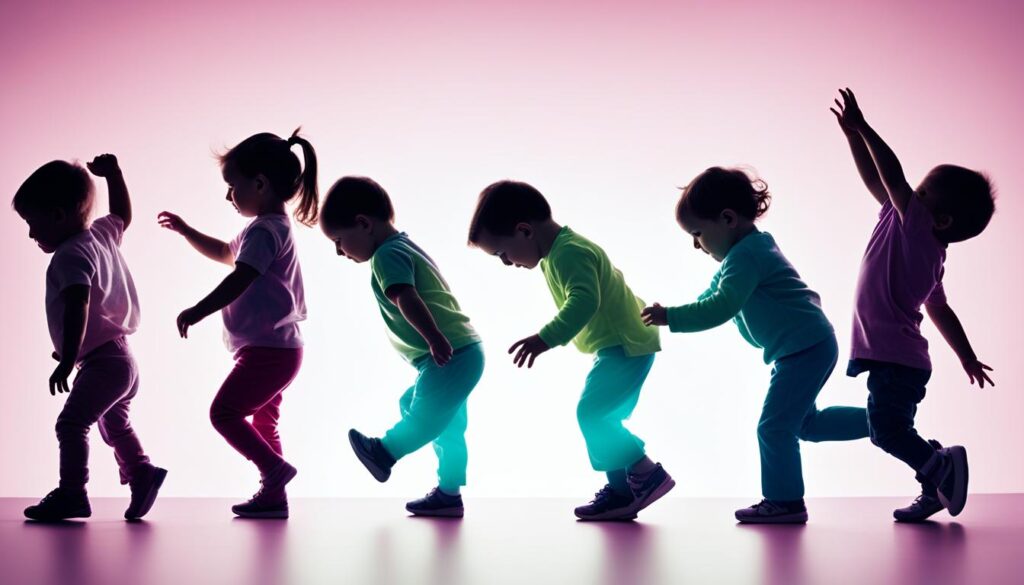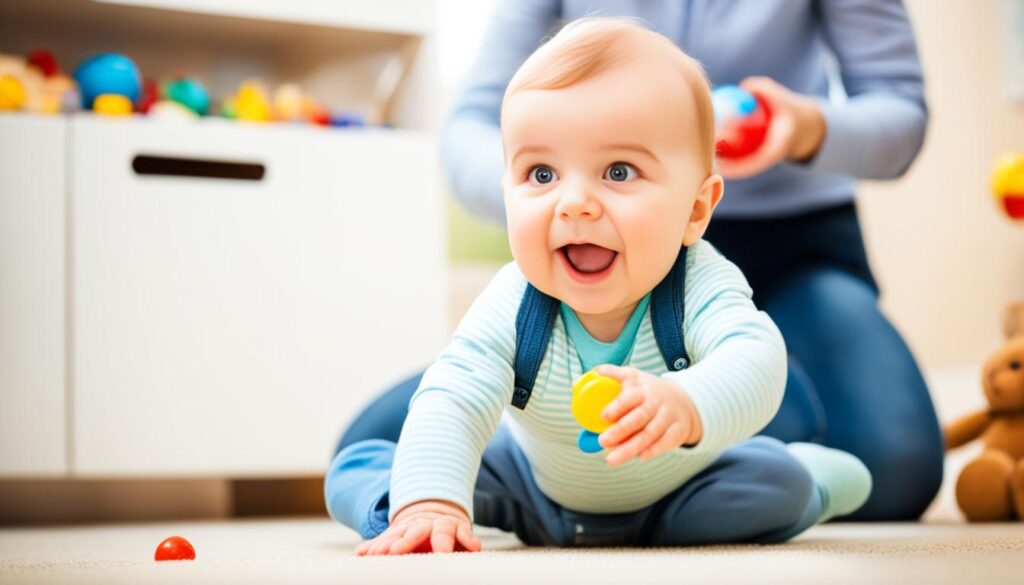Child Development Milestones: Your Quick Guide
Did you know that the first five years of a child's life are critical for their development?
During this time, children go through significant milestones that shape their physical, cognitive, and social skills. As a parent or caregiver, understanding these milestones is essential for providing the right support and identifying any potential delays to ensure your child's healthy growth.

In this comprehensive guide, I will take you through the various milestones that children typically reach from birth to the age of five. You will learn about the important markers at each stage, from the jerky arm thrusts of a one-month-old to the imaginative play of a three-year-old.
Whether you're a new parent or want to ensure your child is on track, this quick guide will provide you with valuable insights into your child's development. Let's dive in and discover the fascinating world of child development milestones.
Milestones at 1 Month
At one month old, your baby reaches important developmental milestones. These milestones indicate the progress and growth your little one is experiencing in their early stages of life.
One of the notable milestones at this age is the jerky arm thrusts that your baby may exhibit. As they begin to gain more control over their body, they will also bring their hands within the range of their eyes and mouth, exploring the world with their sense of touch.
Your baby's head movement from side to side is another significant milestone at one month. This indicates their developing neck muscles and demonstrates their ability to explore their surroundings.
Furthermore, your baby's visual abilities are also improving. They can focus on objects that are approximately 8 to 12 inches away from them. This newfound ability allows them to engage with their environment and start recognizing familiar faces.
Additionally, at one month old, your baby begins to exhibit sensory preferences. They can recognize black-and-white or high-contrast patterns, which captivate their attention. They are also able to identify the scent of their mother's breastmilk, responding to the comforting aroma.
While every child develops at their own pace, it's important to be aware of potential signs of developmental delay at this stage. These signs may include poor sucking and feeding, lack of response to loud sounds, and excessive limb stiffness. If you notice any concerns, it's advisable to consult with your healthcare provider.
Milestones at 3 Months
By three months old, infants experience significant advancements in their physical and cognitive development. At this stage, your baby will start raising their head and chest when lying on their stomach, showcasing improved neck and core strength. They will also become more active, kicking their legs vigorously and reaching for objects with their hands, bringing them to their mouth to explore.
Another exciting milestone is their growing ability to recognize familiar faces, including yours as a parent. Your baby will begin to follow moving objects with their eyes and respond with smiles to sounds and voices they find engaging.
Monitor your baby's progress closely during this period, noting the achievement of these milestones. It's essential to consult with a healthcare professional if you observe any concerning signs of developmental delay in your child. Look out for any absence of milestones such as a lack of eye contact, difficulty grasping objects, or poor head control.
Milestones at 7 Months
At seven months old, your baby is making significant strides in their motor skills and social development. It's an exciting time as they continue to explore the world around them and become more responsive to their environment.
One of the key milestones at this stage is their newfound ability to roll both ways. Your baby may start rolling from their back to their tummy and vice versa, giving them more freedom to navigate their surroundings. This newfound independence is an important step in their physical development.
Another milestone to look out for is their ability to sit without support. Your baby will gain the strength and balance necessary to sit upright without needing assistance. This is an important milestone as it enables them to engage more fully with their surroundings and interact with objects and people at eye level.

Your baby's hand-eye coordination continues to develop at seven months, as they begin to use their hands to explore objects around them. They will not only reach for objects but also grasp them and bring them closer to their mouths to explore through touch and taste.
In terms of social development, your baby will become more responsive to their name. They will turn their head or look in your direction when you call their name, showing that they recognize and respond to familiar sounds and voices.
Furthermore, at this stage, your baby will display an increasing interest in social play. They will enjoy interacting with you and others, engaging in games like peek-a-boo or imitation. They may even imitate movements and facial expressions, mimicking the gestures and expressions they see around them.
While these milestones are exciting to witness, it's also important to be mindful of any potential developmental delays. Keep an eye out for signs such as difficulty crawling, inability to stand with support, and a lack of babbling or gestures. Early identification of any concerns can help ensure that your baby receives the necessary support and intervention for healthy development.
Milestones at 1 Year
The first year of a child's life is filled with significant milestones. By one year old, they can sit, crawl, pull up to stand, and even take a few steps without support. They develop their fine motor skills and hand-eye coordination, enabling them to use objects correctly and engage in simple pretend play. They also start saying words like "dada" and "mama" and respond to simple instructions. Parents should be aware of any delays in these milestones, such as lack of walking, inability to follow instructions, or limited speech.
Milestones at 2 Years
At two years old, your child enters a crucial stage in their development. They begin to assert their independence, eagerly exploring the world around them. Walking alone, running, and climbing furniture become everyday activities for them.
Language skills also take a significant leap during this period. Your child starts using two- to four-word sentences to communicate their needs and desires. They can follow simple instructions and engage in basic conversations. It's an exciting time as their vocabulary expands, and they become more adept at expressing themselves.
Furthermore, their cognitive abilities continue to expand rapidly. They develop the capacity to recognize familiar objects, body parts, and shapes. Imaginative play becomes a favorite pastime as they engage in make-believe scenarios and bring their imagination to life.
As a parent, it's important to pay attention to their development and address any concerns that may arise. Keep an eye out for any potential issues related to gross motor skills, speech delays, or difficulties in understanding and following instructions. Remember that each child develops at their own pace, but being aware of the typical milestones can help identify areas that may need additional support.
Milestones at 3 Years
By the age of three, children continue to make significant progress in their physical, cognitive, and social-emotional development. At this stage, they are becoming more independent and capable of engaging in a variety of activities.
Physical Development
Physically, three-year-old's are growing stronger and more coordinated. They can pedal tricycles, climb stairs with alternating feet, and build towers with blocks. Their fine motor skills are improving, allowing them to draw basic shapes and accurately use utensils during mealtime.
Cognitive Development
In terms of cognitive development, three-year-old's are expanding their language skills and vocabulary. They can use three- to four-word sentences to express their thoughts and understand and follow more complex instructions. They are curious and ask many questions, demonstrating a growing understanding of cause and effect. Their problem-solving abilities are developing as they begin to recognize patterns and engage in simple logical reasoning.
Social-Emotional Development
Three-year-old's are becoming more social and aware of their emotions and those of others. They enjoy playing with their peers and engage in interactive games and role-playing. They imitate others' actions and behaviors, showing an eagerness to learn and explore their environment. They are also capable of expressing their feelings and can begin to exercise self-control and engage in simple problem-solving.
While most children reach these milestones by the age of three, it's important to remember that each child develops at their own pace. However, if you notice any potential delays or concerns in areas such as balance and coordination, limited speech, or difficulty in social interactions, it's advisable to consult with a healthcare professional for further evaluation and guidance.
Conclusion
Understanding and tracking your child's development milestones is crucial for providing appropriate support and detecting potential delays early on. By familiarizing yourself with the typical milestones, you can effectively monitor your child's progress and identify any areas where they may need extra attention.
Remember that every child develops at their own pace, and there is a wide range of normalcy when it comes to developmental milestones. However, it's important to be aware of any significant deviations from the expected milestones, as they could be early indicators of developmental delays or other concerns.
Regular check-ins with healthcare professionals, such as pediatricians or child development specialists, can provide you with valuable guidance and reassurance. These professionals can evaluate your child's growth and development, address any concerns you may have, and offer appropriate interventions or therapies if necessary.
By staying engaged, observant, and proactive in your child's development, you are laying the foundation for their future success. Remember, supporting your child's development is an ongoing journey, and with the right knowledge and resources, you can ensure they are on the right track for healthy growth and fulfillment.



